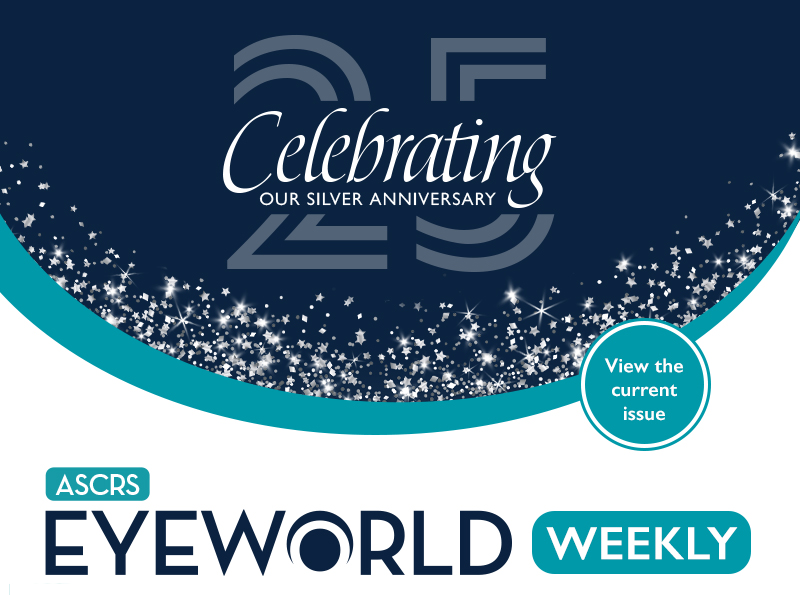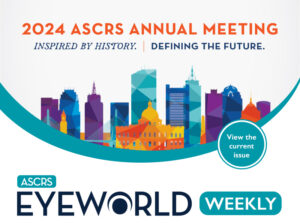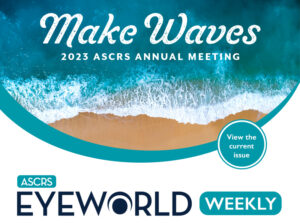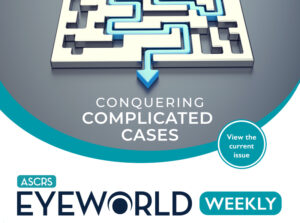
- Orphan drug designation granted for retinitis pigmentosa treatment
- Licensing agreement for progressive myopia treatment
- Study: Gene editing prevents Fuchs in mice
- Enrollment complete for Phase 3 program evaluating anti-inflammatory, immunomodulation drug for DED
- ASCRS news and events
August 13, 2021 • Volume 27, Number 32
Orphan drug designation granted for retinitis pigmentosa treatment
Aldeyra Therapeutics announced that it received an orphan drug designation from the FDA for ADX-2191, a possible treatment for retinitis pigmentosa. In addition, it received the orphan drug designation to investigate this drug for treatment of primary vitreoretinal lymphoma and proliferative vitreoretinopathy. According to the company’s press release, this methotrexate intravitreal injection is designed to inhibit dihydrofolic reductase, an enzyme involved in cellular replication and activation.
Licensing agreement for progressive myopia treatment
Santen and Sydnexis entered into an exclusive licensing agreement for the latter company’s investigational low-dose atropine formulation for progressive myopia, SYD-101. SYD-101 is currently in a Phase 3 clinical trial in Europe and the U.S. According to the company’s press release, this formulation has a lower pH to achieve a stable shelf-life of up to 3 years at room temperature.
Study: Gene editing prevents Fuchs in mice
Results from an 8-year study out of the University of Oregon showed how a gene-editing technique was able to prevent Fuchs endothelial corneal dystrophy (FECD) in mice. According to a press release from the university, CRISPR-Cas9 technology was used to block expression of the COL8A2 gene, which leads to early onset Fuchs by targeting its start codon, disrupting protein expression at the start of its synthesis process. The research published in the journal eLife described how a single intraocular injection of this gene-editing technology was able to knock down mutant expression of the gene, preventing endothelial cell loss. The authors described this treatment as a “non-surgical strategy to prevent vision loss in early-onset FECD.” According to the university press release, the research will serve as the basis for future studies looking at this as a potential therapy for Fuchs in animal, non-human primates, and potentially humans.
Enrollment complete for Phase 3 program evaluating anti-inflammatory, immunomodulation drug for DED
Novaliq announced enrollment completion for its Phase 3 program evaluating EyeSol, a topical, water-free, anti-inflammatory, immunomodulating ophthalmic solution with 0.1% cyclosporine A, for the treatment of signs and symptoms of dry eye disease (DED). According to the company’s press release, 834 patients were enrolled in the Phase 3 program, which includes two studies: one a double-masked, multicenter, randomized, vehicle-controlled study and the other an ongoing, multicenter, open-label, single-arm, 12-month safety extension trial. The results of the latter are expected in the fourth quarter of this year and, if positive, would allow for an NDA filing in 2022, according to the company.
ASCRS news and events
- Ophthalmology Quicksand Chronicles podcast: Episode #10 with Zaina Al-Mohtaseb, MD, discussing the case of an unrelenting uveitic cataract is available on YouTube and other podcast platforms.
- ASCRS Foundation: Donations to the ASCRS Foundation helped unlock a match from Aerie Pharmaceuticals, raising a total of $109,411 for charitable eyecare. According to the Foundation, this amount will help change the lives of an additional 438 patients in 2021.
- ASCRS Clinical Survey: Fifteen minutes of your time can help inform the future of ASCRS educational initiatives. ASCRS members are eligible to take the ASCRS Clinical Survey.
Research highlights
- A paper published in JAMA Ophthalmology looked at the ocular injuries that occurred as a result of the Aug. 4, 2020 Port of Beirut blast, which the authors stated was “one of the most powerful nonnuclear explosions in history.” Thirty-nine survivors with ocular injuries (48 eyes) were included in the study, 22 of whom reported to emergency clinics the day of the blast and 17 of whom presented with injuries within 3 months. Most of the injuries were debris and shrapnel in the eye, eyelid lacerations, orbital fractures, brow lacerations, hyphema, and open globe injuries, according to the paper. The report noted 21 patients requiring surgical intervention, half of which were urgent. The authors reported seven eyes having a final BCVA of less than 20/200, including four cases of open globe injuries that had no light perception. The authors stated that delayed presentation in some cases was due to strain on healthcare services at the time.
- A retrospective case series from a single center evaluated cataract surgery outcomes (2004–2018) in 100 eyes (65 patients) with previous RK. The mean age at the time of cataract surgery was 59.8 years old and 39% of eyes had other ocular pathology at the time. BCVA improved postop with 52.6% of eyes being within 0.5 D of predicted spherical equivalent and 68.4% within 1 D when the Haigis formula was used. This was compared to 32.7% and 52.7% within 0.5 D and 1 D of predicted spherical equivalent, respectively, when Double-K SRK/T was used, and 27.8% and 38.9% within 0.5 D and 1 D of predicted spherical equivalent, respectively, when SRK/T was used. The most common complication was RK incision dehiscence, according to the authors. They concluded that fewer eyes with RK achieved unaided distance visual acuity, compared to U.K. benchmarks for eyes that didn’t have RK. The research is published in the journal Eye.
Product news
- RightEye launched Sensorimotor, a device that automates binocular vision testing.
This issue of EyeWorld Weekly was edited by Stacy Jablonski and Liz Hillman.
EyeWorld Weekly (ISSN 1089-0319), a digital publication of the American Society of Cataract and Refractive Surgery (ASCRS), is published every Friday, distributed by email, and posted live on Friday.
Medical Editors: Eric Donnenfeld, MD, Chief Medical Editor; Rosa Braga-Mele, MD, Cataract Editor; Clara Chan, MD, Cornea Editor; Nathan Radcliffe, MD, Glaucoma Editor; and Vance Thompson, MD, Refractive Editor
For sponsorship opportunities or membership information, contact: ASCRS • 12587 Fair Lakes Circle • Suite 348 • Fairfax, VA 22033 • Phone: 703-591-2220 • Fax: 703-591-0614 • Email: ascrs@ascrs.org
Mention of products or services in EyeWorld Weekly does not constitute an endorsement by ASCRS.
Click here to view our Legal Notice.
Copyright 2021, EyeWorld News Service, a division of ASCRSMedia. All rights reserved.



